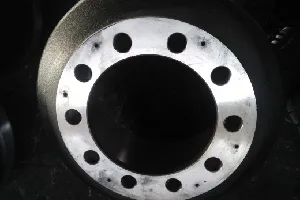brake drums squeaking
Understanding the Causes and Solutions for Squeaking Brake Drums
Brake drums are an essential component of a vehicle's braking system, particularly in older models and trucks. Unlike disc brakes, which use flat rotors, drum brakes consist of a cylindrical drum that houses brake shoes, which press against the drum to slow or stop the vehicle. However, many vehicle owners often encounter an annoying issue squeaking brake drums. This article will explore the causes of this problem and the steps that can be taken to prevent it.
Common Causes of Squeaking Brake Drums
1. Dust and Debris One of the primary reasons for squeaking brake drums is the accumulation of dust and debris. As the brakes are used, dirt, brake dust, and other particulates can collect inside the drum. When the brake shoes make contact with the drum, this debris can cause a squeaking sound.
2. Moisture and Rust Brake drums are usually made of metal, which is susceptible to rust. Moisture exposure can lead to surface rust forming inside the drum. When the brake shoes come into contact with the rusted surface, they can create a squeaking or squealing noise.
3. Worn Brake Shoes Over time, brake shoes wear down. When they become thin, they may not make solid contact with the brake drum. This improper fit can cause vibrations and noise. If the brake shoes are worn unevenly, the likelihood of squeaking increases.
4. Glazed Brake Shoes or Drums If the brakes have been subjected to excessive heat, such as from hard braking or prolonged use, the surfaces of the brake shoes or drums can become glazed. A glazed surface is smooth and hard, which can lead to a loss of friction and result in squeaking when the brakes are applied.
5. Improper Installation Sometimes, brake components may not be installed correctly. Misalignment of the drum or shoes can lead to uneven contact and noise. Additionally, if the brake system has not been lubricated properly, it can contribute to unwanted sounds.
6. Lack of Maintenance Regular maintenance is crucial for any vehicle, especially for critical components like the braking system. Neglecting brake inspections and service can lead to problems, including squealing or squeaking brake drums.
brake drums squeaking

Solutions to Squeaking Brake Drums
1. Cleaning the Drums If dust or debris is suspected to be the culprit, cleaning the brake drums can often resolve the noise. Removing the drum and thoroughly cleaning it with brake cleaner can eliminate any particles causing the squeak.
2. Inspecting for Rust If rust is present, it can be removed with a wire brush or sandpaper, followed by applying a protective coating to prevent future corrosion. For extensive rust damage, replacement of the drum may be necessary.
3. Replacing Worn Brake Shoes If the brake shoes are worn out or uneven, it’s essential to replace them. New brake shoes will provide better contact with the drum and can eliminate noise.
4. Resurfacing or Replacing Drums If the drums are glazed or out of specification, they can be resurfaced or replaced to restore smooth operation and prevent squeaking.
5. Proper Installation and Lubrication Ensuring that the brake components are correctly installed and that all necessary lubrication points are serviced can significantly reduce the likelihood of noise. Using brake grease on the backing of the shoes can help as well.
6. Regular Maintenance Checks Establishing a routine maintenance schedule for the brakes will allow for early detection of wear and issues. Keeping an eye on the braking system not only enhances performance but also extends the lifespan of components.
Conclusion
Squeaking brake drums can be more than just a nuisance; they can signal deeper issues with your vehicle’s braking system. Understanding the common causes—ranging from dust and rust to worn or improperly installed components—empowers vehicle owners to take corrective action. By following proper maintenance practices and addressing issues promptly, you can ensure that your braking system remains effective and quiet, keeping both you and your passengers safe on the road.
-
Truck Drum Brake Spring Replacement ProcedureNewsAug.22,2025
-
Evolution Of Brake Drum Function Designs In Automotive HistoryNewsAug.22,2025
-
Drum Brake Motor Thermal Management SolutionsNewsAug.22,2025
-
Essential tools for brakes and drums repair jobsNewsAug.22,2025
-
Trailer Drum Brake Self-Adjusting Mechanisms ExplainedNewsAug.22,2025
-
Brake Drum Types in Vintage Auto RestorationNewsAug.22,2025
-
Rear Drum Brakes Maintenance TipsNewsAug.04,2025


